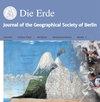气候变化中的移民。迈向跨地方社会弹性方法
IF 0.6
4区 地球科学
Q3 GEOGRAPHY
引用次数: 60
摘要
气候变化和移民正在引起研究人员、政策制定者以及普通公众越来越大的兴趣。虽然在一开始,对环境对人类流动性影响的简单化和地缘决定论的理解主导了讨论,但这种关系的框架最近变得更加分化。来自农村生计研究的大量经验证据清楚地表明,移民是家庭在应对包括环境压力在内的多重风险时的一项重要战略。这使得在移民环境研究中“移民即适应”的观点得到越来越多的认可。我们认为这一概念的发展是更好地理解这一联系的重要步骤。尽管如此,作为适应的移民有几个缺点。首先,它狭隘地关注移民作为对环境风险的适应性反应,而忽略了其他形式的移民的重大影响。其次,它没有涵盖人们、社区和社会如何应对环境变化的其他方面:人们往往对恢复力建设过程视而不见。第三,作为适应的移民已经被发现以一种证明具有新自由主义倾向的移民政策的方式来解释。为了克服这些缺陷,我们提出了一种整合跨地域和社会弹性的方法。因此,本文引入了跨地方社会弹性的概念,并对其概念含义进行了反思。因此,我们将展示这种方法如何提高对迁移-环境关系的理解,以及它如何塑造迁移作为适应的概念,允许对迁移-环境背景下的动态进行细致入微和批判性的看法。本文章由计算机程序翻译,如有差异,请以英文原文为准。
Migration in a changing climate. Towards a translocal social resilience approach
Climate change and migration are drawing increasing interest from researchers and policy makers as well as from the general public. While in the beginning a simplistic and geo-deterministic comprehension of the environmental impact on human mobility had dominated the discussion, the framing of the relationship has recently become more differentiated. Vast empirical evidence derived from rural livelihoods research clearly shows that migration is an important strategy of households when dealing with multiple risks, including environmental stress. This has led to the growing acknowledgement of the idea of “migration as adaptation” in migration-environment research. We consider this conceptual development an important step for a better understanding of this nexus. Nonetheless, migration as adaptation has several shortcomings. Firstly, it is narrowly focused on migration as an adaptive response to environmental risks and neglects the significant impact of other forms of migration. Secondly, it does not cover other dimensions of how people, communities and societies deal with environmental change: a blind eye is all too often turned to processes of resilience building. Thirdly, migration as adaptation has been found to be interpreted in a way which justifies migration policies with neo-liberal tendencies. In order to overcome such drawbacks, we propose an approach that integrates translocality and social resilience. In this paper we thus introduce the concept of translocal social resilience and reflect on its conceptual implications. We will thereby show how this approach can improve the understanding of the migration-environment nexus, and how it can also shape the concept of migration as adaptation, allowing for nuanced and critical views on the dynamics in the migration-environment context.
求助全文
通过发布文献求助,成功后即可免费获取论文全文。
去求助
来源期刊

Erde
GEOGRAPHY, PHYSICAL-GEOSCIENCES, MULTIDISCIPLINARY
CiteScore
2.90
自引率
6.20%
发文量
0
审稿时长
>12 weeks
期刊介绍:
DIE ERDE is a publication of the Geographical Society of Berlin
DIE ERDE is a scientific journal in Geography, with four issues per year with about 100 pages each. It covers all aspects of geographical research, focusing on both earth system studies and regional contributions.
DIE ERDE invites contributions from any subfield of both Physical and Human Geography as well as from neighbouring disciplines.
 求助内容:
求助内容: 应助结果提醒方式:
应助结果提醒方式:


